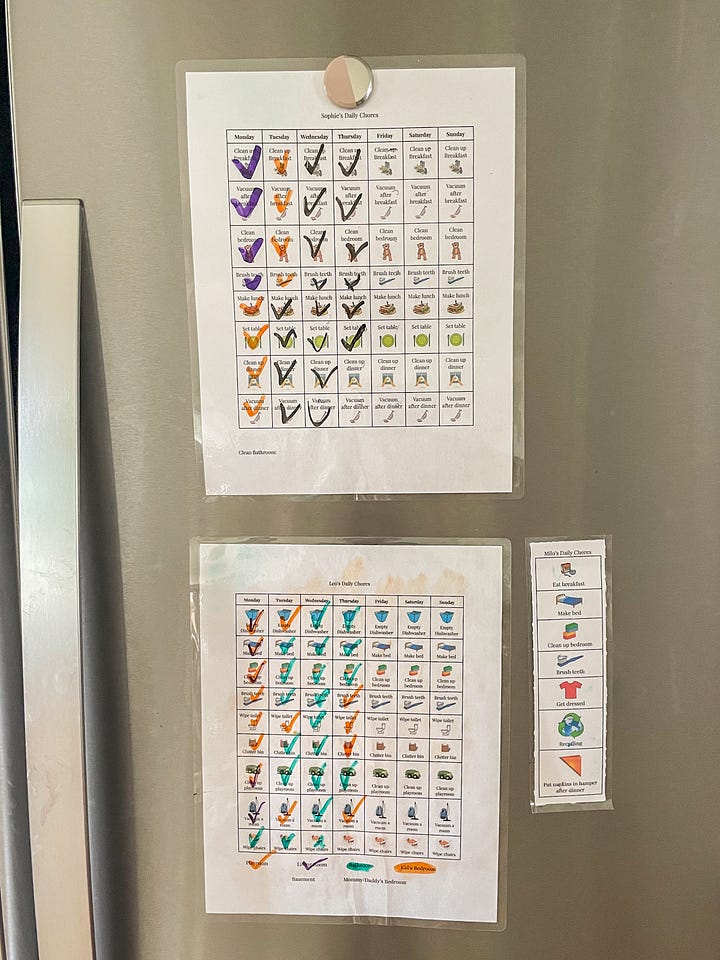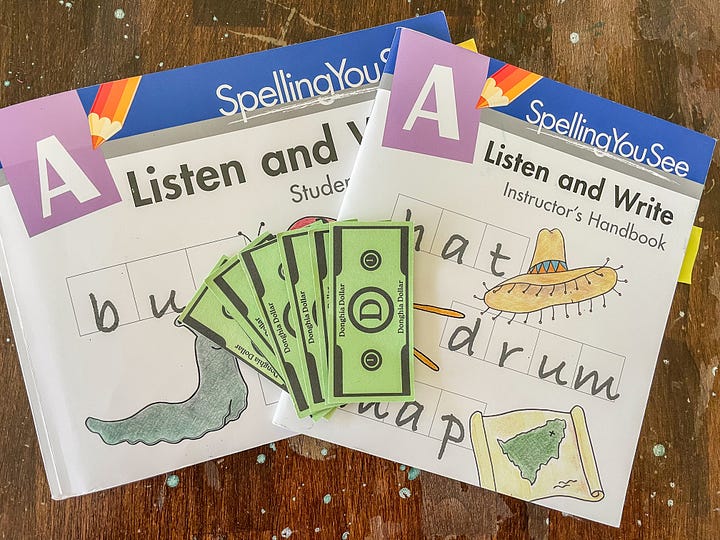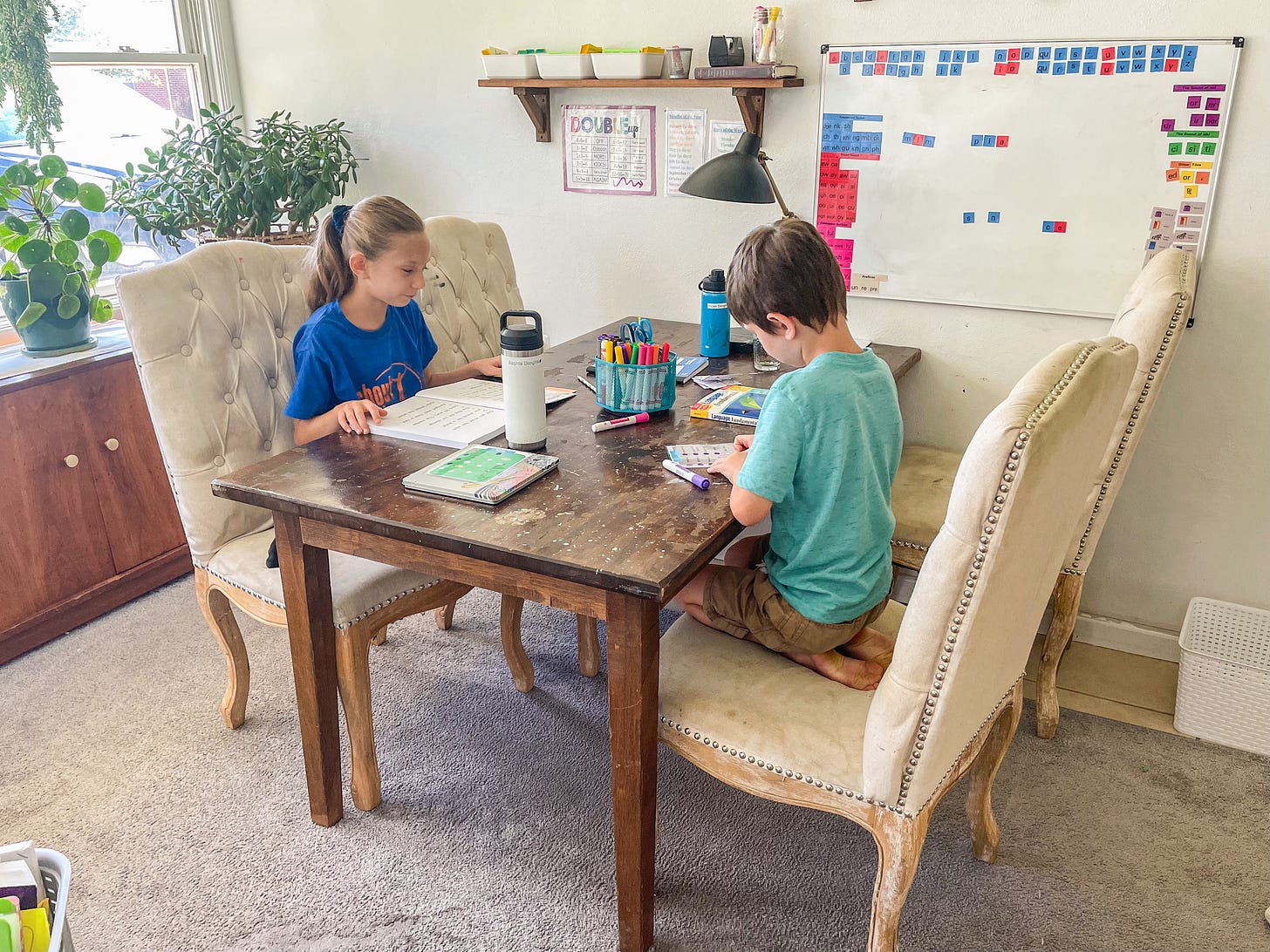3 Simple Systems That Keep Our Kids Motivated Every Day
In my 10 years of being a mother, I’ve found a handful of “game changing systems” and “mom hacks” that I now use over and over again. Finding ways to motivate and encourage my children to do hard things is one of these. In today’s modern world, motivating kids can be viewed as bribing or even gifting something unnecessarily in order to get kids to do a task, but from my years as an elementary teacher and now homeschooling mama, I can see how motivation carries a big weight and is an important piece of the puzzle of learning.
Research shows that motivated kids perform better academically and also develop stronger problem-solving skills, persistence, and self-confidence. Studies on intrinsic motivation (doing something because it’s inherently enjoyable) show that when children are given autonomy and meaningful rewards, they demonstrate higher levels of creativity and long-term achievement.
In our family, we’ve seen how motivation goes a long way. My kids become inspired with a little boost— not as a bribe, but as encouragement that helps them rise to the challenge. We see motivation as empowerment, equipping our children to do a thorough job with their schoolwork, chores and other life skills. By putting systems in place, we make it clear that effort and attitude matter and that rewards for hard work are earned, not freely given. These lessons prepare them not just in childhood but for life ahead.
Our 3 Favorite Systems of Motivation
1. Motivating Through Chores
By age three, our kids begin age-appropriate chores. At this age, kids are eager to become helpful around the house so we’ve found that giving them jobs that align with their developmental abilities is a great way to teach them key life skills and independence. In the early years of giving our kids chores, it involves a lot of modeling and teaching how to do tasks thoroughly with gentle correction and guidance.
By age ten, our daughter can mow the lawn, clean the bathroom, manage dishes and dinner cleanup, and fold laundry. The key here has been motivating her with smaller tasks at a younger age where she felt encouraged with a sense of independence. Over the years, her motivation to take on bigger chores has grown significantly (and has been extremely helpful for us!).
To motivate our kids and make daily chores a realistic part of our days, each of our kids has their own chore chart that hangs on our fridge. Each day, they check off individual chores as they complete them. Then, when the week is over, they receive a small allowance for their work. Just like in the real world with a job, we have two rules about how they get paid— chores must be done thoroughly without complaining.
Our kids gain a sense of motivation each time they see their hard work rewarded and every few months ask if they can take on larger chores to earn more money!


2. Motivating During School
At the start of this school year, my husband and I implemented a motivation system to our homeschool that I previously used for years as an elementary school teacher. It’s called “Donghia Dollars”. We wanted to create a more motivated atmosphere for learning as well as reinforce positive behavior.
The gist is simple— our school aged kids earn one “Donghia Dollar” for each part of our school day when the task is completed with a good effort and attitude. We break our school time into 15-30 minute chunks, so over the course of the day they each might earn 8-10 dollars…which adds up quickly!
Only having used this system for a month, I can already see some incredible successes— they’re ready to start our day on time, they work more diligently, and there’s less complaining. As motivating it is to receive dollar after dollar, they can also lose dollars for poor work or a bad attitude.
Dollars are then spent at the family store with “prizes” ranging in cost— smaller items like a pack of gum only cost our kids 30 Donghia Dollars whereas a date with a parent might be 200 Donghia Dollars. This system not only motivates our kids to strive for quality work in school, but it also teaches them to manage their money by saving for bigger items over a longer period of time.


3. Motivating a Love of Reading
Like our system of motivating our kids during school time, we created a similar one to encourage our kids to enjoy reading independently (which has been the biggest success in my daughter’s reading progress after being a reluctant reader for several years).
It’s called Book Club Bonanza (the title was decided on a whim but the pithy name of our club is a big hit with my kids!). At the start of the month, I give the kids a bookmark that has a reading challenge on it. This month, their goal is to read 30 hours independently. Each time they read for a 30-minute period, they color in a box on their bookmark. This allows them to pace themselves throughout the month and stay motivated as they see how many hours they have left.
At the end of the month if they’ve completed the challenge, they get the reward— a visit to the candy store, ice cream shop, out for breakfast, or another fun treat that seems like a big deal!
To add more motivation to this system, there’s extra rewards for going above and beyond. If they choose to read beyond their goal, they receive bonus “Donghia Dollars” for those hours read.
Independent reading is strongly linked to literacy success, and this book club system has boosted both enthusiasm and their reading skill and has greatly broadened their scope of great books.


Motivation is Key
Creating your own motivation systems doesn’t have to be elaborate or feel like you’re handing out prizes for every task or job completed (because I don’t believe that’s healthy or a positive way to train kids either). For us, it’s about clear expectations and challenging our kids to rise to a level that pushes and encourages them.
Chores teach them that they’re an important part of our family team. Our family dollar system makes school feel purposeful and keeps complaining to a minimum (most days!). And our Book Club Bonanza has turned reading into a process they own for themselves.
These systems aren’t perfect and we often have to tweak and adjust them as our kids grow, but they’ve made a huge difference in our home. There’s less complaining, more helpfulness and hard work, and a lot more pride in a job well done. Most of all, our kids are learning that persistence and a good attitude bring good things, which is a lesson we hope sticks long after childhood.
If you’re looking for a way to spark motivation in your homeschool (or just everyday family life), start small. Pick one area such as the ones I mentioned here— chores, schoolwork, or reading…and add a simple system and a meaningful reward. It’s amazing how a little structure and celebration can help kids push through the hard things and thrive.
I’d love to hear what’s working in your home— hit reply or leave a comment and tell me how you motivate your kids (or what’s been the hardest part of keeping them on track). And as always, thank you so much for being here and following along on my journey!




Hi Mollie,
My name is, Bethany Davis. I really enjoyed reading this post of yours. My folks also used various incentives for my 3 older brothers and myself when we were all growing up. We too would get a small allowance, or they would use Monopoly money that we would "earn" for different things. The chore chart I had when I was little was that I would put a Star sticker next to the completed chore; then after a week or so of me being faithful in completing my various tasks; I would get a penny or two. After awhile of earning pennies and Stars; I THINK I moved up to regular paper money (?) Anyway, after awhile of that, I would get to pick out or do something special. Yes, motivation is the key for anything. I also think it helps kids with goal setting later on in life. At least, it helped me.
God Bless!
Bethany Davis
I loved these ideas! As a lover of books, I really liked your Book Bonanza club! When my kids get more independent with reading, I really want to do something like this. Right now, I have three rules, Good atititude, Be patient, Listen and Obey. They earn three stickers for each rule. At the end of about 2 weeks, we add up their stickers and if they earn a certain amount they get a donut! It's worked for us so far, but my kids are younger, 2, 4, and 6. And our school "day" is only about an hour of sit down work. So during that hour I am looking for my three rules to be followed.